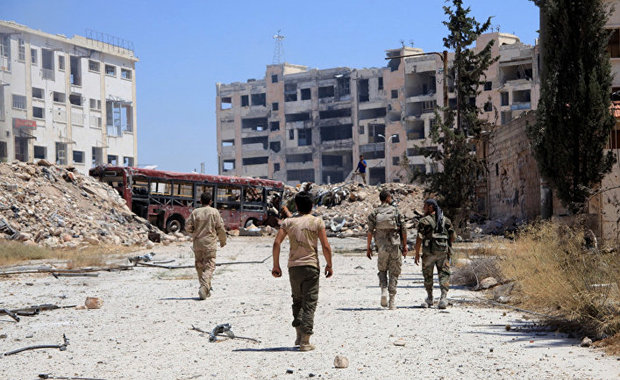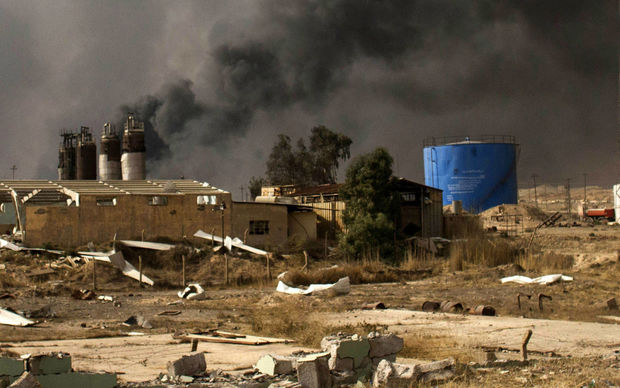Mitchell Belfer: ''Syrian army is facing its own internal issue — its allies from Hezbollah and Iran''
A professor from Prague saw a slow and slight rehabilitation of Assad in the West
Assault on the economic capital Aleppo with the support of Bashar Assad is a done deal. Against this background, an expert of Realnoe Vremya, senior lecturer in the Department of International Relations and European Studies at the Metropolitan University (Prague) thinks that contradictions between the Syrian army and its allies will aggravate.
''In fact, Russia has a position, and America doesn't''
Mr Belfer, can we be waiting for any Russian-American consensus about Syria after Trump's win?
Probably, yes. But it would not be because of Trump's win. I think, naturally, when it comes to a couple of key strategic areas, both the Unites States and Russia realise that cooperation is going to be more productive, for example, than confrontation and both of them have their own sphere of influence: Syria is in Russia's and Iraq is more in America's. They may be better aligning their positions.
Could you tell us about the main difference in positions of the two countries in terms of Syria?
Well, in fact, Russia has a position, and America doesn't. Whatever the criticism people have about Russia, they neglect the fact that Russia does have a foreign policy interest there, and it is pursuing that foreign policy interest using the means that are available to it. The US is not really sure on how to react. They supported different fractions within the opposition groups there. On the other hand, the US has not been very pro-active in Syria while Russia has been. So, for better or worse, Russia is pursuing a foreign policy interest.
Our op-ed columnist Anhar Kochneva wrotethat rebels in western Aleppo hoped to break the blockade. However, Syrian militants have already entered western parts of the city with the support of Russia. How soon will the rebels in Aleppo lay down their arms?
It's a great question. Now what you see is that both the government and its allies, including Russia, Shia militias of Iran have been trying various techniques in order to try to get their rebels to voluntarily lay down their arms. At this point, the conflict in Syria, especially around Aleppo, is too close to home. I don't think that anybody will voluntarily lay down their weapons. The key is going to be for one side or another to win the war without following a kind of ethnic cleansing that's likely to take place.
When it comes to Russia in Aleppo, I think Russia needs to take a step back. Once it gets too personal between Syrians themselves, I don't think that Russia wants to be dragged into a real bloodletting but rather try to restrain its allies from conducting atrocities.

''Now what you see is that both the government and its allies, including Russia, Shia militias of Iran have been trying various techniques in order to try to get their rebels to voluntarily lay down their arms. At this point, the conflict in Syria, especially around Aleppo, is too close to home. I don't think that anybody will voluntarily lay down their weapons.'' Photo: George Ourfalain/AFP (inosmi.ru)
''Syrian army is facing its own internal issue, its allies''
What difficulties will the army have to face during the assault on western Aleppo?
We are talking about a variety of different groups that are fighting against them. Some groups are secular. It is the heartland of Sunni economic and even military power in the country. The fight waging there is very strong.
The other problem that the Syrian army is facing is from its own internal issue, its allies. Here we have to raise the issue of Iran. There has been more than one case of the Syrian army and the Iranian-backed militias operating near Aleppo shooting at each other. And the same with Hezbollah. And now, the way that the conflict is evolving, the Syrian army will not necessarily be neutral to the way that Hezbollah is conducting its own war against the Sunni communities of Northern Syria.
Will coalition forces and participation of American militants help?
Not really. What you are seeing there is this disengagement of the West and their coalition in Syria and the reinforcement of their coalition in Northern Iraq. By this time next year, you will likely be talking about a western alliance in Syria, the role of, for example, Iran or Shia militias in Syria with the Syrian government support of Russia.
The Syrian government promised that it would not persecute those people who would voluntarily lay down their arms and come back to peaceful life. How many rebels agreed to meet this condition?
I don't know the numbers but I don't think very high. I don't think that there is a great deal of trust between the rebels and the government. And I don't think that their trust is going to be any better. All we are looking at is a situation where you are going to get an end, hopefully, to the hostilities but no return to normality for some time.
''ISIS is not getting many recruits''
And will the Assad government keep its promise?
If somebody lays down their arms, maybe. But I doubt it. The conflict is too personal now.
Why is the assault on Mosul taking much time?
It is not an easy battle in Iraq. You need to do it properly, to wage the battle properly, isolate the forces that are there, cut them off their supply, and still preserve as much as possible human life, it needs to be a slow arduous campaign. And that's what is happening. If you look at what ISIS is launching back against the coalition fighting them, it is very scattered, it is not cohesive or comprehensive in terms of leadership. They (coalition) are slowly tightening the noose, which is better for the preservation of human life. Of course, they could have gone and blown up every building. But it would be catastrophic for civilians. So I think that it is going slow but not particularly slow. I think it is a good reason.
These days it has been said that Sunni militias have gone over to ISIS in Mosul. Why?
I think only those that were predetermined to do it joined ISIS. I think ISIS is not getting many recruits. ISIS is a dying organisation. The problem is not going to be destroying ISIS in Syria or Iraq, the problem is what happens once the territory in Syria and in Iraq are basically cleansed of ISIS fighters. Then the war and terror is going to come back into Europe, Russia and to the U.S. That's what we are going to try to avoid, collectively, because everybody shares that interest.
Who is in Mosul: ISIS or a coalition of different groups?
I think primarily it is ISIS. The other groups have already disintegrated or joined ISIS. I mean ISIS has a kind of iron fist. Mosul is their financial capital. I am very confident that it is ISIS.

''A slow arduous campaign is what is happening there [Editor's Note: in Mosul].'' Photo: AP (novayagazeta.ru)
In Russia, it is told about the role of Russia in solution of the Syrian crisis only. Pro-Russian media also write that western partners impede our country from reaching peace in the country. What role do western countries play?
As I said, not very much. There is no real cohesive policy of the US or NATO when it comes to Syria. There are a lot of red lines, and it was wrong of the administration to draw red lines since they were crossed and violated. Chemical weapons were used, sectarianism was heightened and red lines were not observed. Only Russia is pursuing a foreign policy from the outside. Before that only regional actors were involved.
I think in 2013 the first red line was crossed with the use of chemical weapons. The Americans and French sent naval ships that later stopped and turned back home without taking any action. Russia was involved only 1.5 years later. The Iranians are not very active. They are present but they are not active directly only through Hezbollah and other Shia militias.
Do they really cry for toppling Assad?
If you asked me that question a year ago, I would say 'yes'. But now I don't think so. In political terms, we are going to see a slow and slight rehabilitation of Assad in the West. All of a sudden, a European Parliament's Delegation went there. European newspapers are reporting about Assad as reinforcing stability in the country. A year ago, it was different. But now you really start to see people coming back and rehabilitating.
Syrian Kurds urged international forces to help to liberate Raqqa. However, Russia knows nothing about the reaction of the USA and Turkey. Don't they want to tell us? Or can't they do it? Perhaps they just don't tell us.
Raqqa is a big mystery. It is a small and strategic city. It would be the easiest place to isolate ISIS.
I am pretty sure that America and Turkey have a plan on the bombardment of the city. Raqqa is a strange place because it is the capital of the Islamic State. I am not sure what's really happening there. I don't know that there is much public information available.
How many ISIS fighters are foreign? Which countries 'exported' the greatest number of soldiers for ISIS to Syria and Iraq?
It is a changing number as well. A part of them came from other parts of the Arab world. Still, I think the majority of them are coming from the countries like Syria, Iraq, the Central Asian republics. There is a tremendous amount of ISIS-related fighters coming from Uzbekistan and Kazakhstan. 1,800 fighters come from Europe. Their numbers are very sketchy because people often don't know who is who.
Reference
Mitchell Belfer is Senior Lecturer in the Department of International Relations and European Studies at the Metropolitan University (Prague), President of the Euro-Gulf Information Centre (Rome, Italy) and Editor in Chief of the Central European Journal of International and Security Studies.